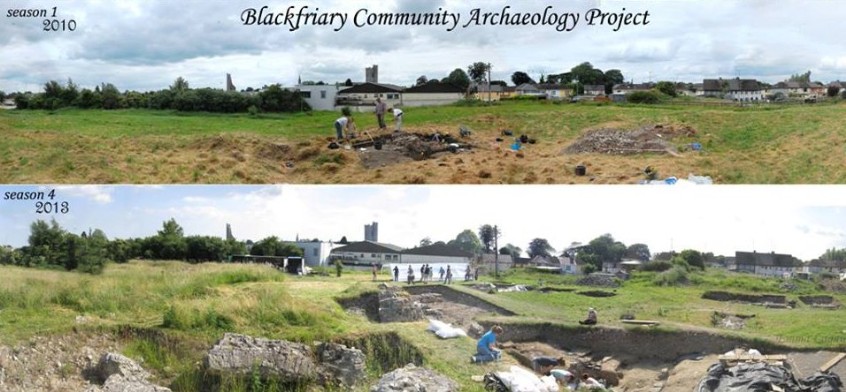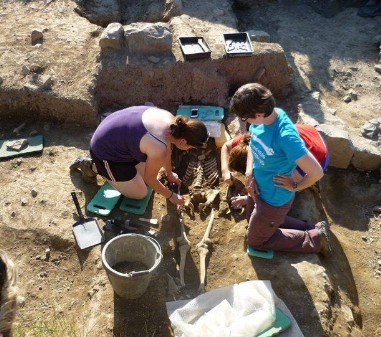Blackfriary Dig - Michael Farry
Main menu:
- Home Page
- Poetry
- History
The Friary Dig

A Novice Enters the Friary
I was unskilled, book-
without practical experience.
‘Teach me’, I implored
and the supervisor showed me how to dig,
fill a barrow, dump by the ditch.
Then the mattock work, more careful,
alert for bits brought near the surface
by seven disturbed centuries.
When I had proven my diligence
by recognizing plaster scraps
and finding two pieces of worked stone –
window surrounds maybe –
I was allowed on my knees
to scrape the earth, collect plaster,
glass, lead and bone fragments
The first skull shocked me,
lucky my trowel avoided shattering
the wafer-
their brushwork and wooden skewers
took patient days to uncover the skeleton.
They thought it male, old, my height.
An aged mendicant friar, they speculated,
with a dispensation to take baths,
eat meat and use linen underwear.
I see him, too old for questing,
too worn out for preaching,
happy to end his days in prayer,
reading and composing sweet new psalms
he will never have time to write down.

He Sees the Infant Skeleton
I stopped and stared
at the two American students,
kneeling in the priory chancel,
absorbed in the task, silence essential.
Their wooden skewers loosened packed earth,
their brushes reverently scratched soil
from around a skull
as they uncovered the skeleton.
Stains marked the nails
of his or her small coffin.
I measured by eye,
guessed the age at less than one,
wondered what grief-
ensured a burial in the holiest place
for their untimely corpse.
I asked nothing, scared of disturbing
their concentration but each, I’m sure,
chose a Christian name for the dead one.
It was gone the next day,
taken in a plastic bag for interrogation,
the answers to be noted
in an academic publication
adding to the sum of our knowledge
of burial, belief
and the uncertainties of childhood.
Only the name will escape them.
I called him Christopher.
Last year, 2013, I spent a couple of days as a volunteer on the Blackfriary archaeology dig in Trim which is run by the Irish Archaeology Field School. I've always been interested in archaeology, did it for my BA from UCD which was done as a night student long ago so no hands-
So I wrote a series of poems about the dig, mixing fact and fiction, present and past. The IAFS have kindly displayed some of the poems at their pop-
The Dominician mendicant friars who lived in the priory would have been engaged on the quest, begging for alms, as a regular activity, hence "questing" in the first poem.
At a conference in Trim Colman Ó Clabaigh OSB, an expert in this field, said that the Dominicians in particular were prone to grant dispensations from some of their rules to their friars.
In his book "The Friars in Ireland 1224-
Seeing the students excavate the skeleton of an infant with great care and respect makes a deep impression. I had a brother and an uncle, both named Christopher, who died in infancy.
The third poem intertwines the thoughts of a student going back after an unforgettable summer in Trim with the thoughts of an old mediaeval man approaching death making bequests to the Friary to ensure a happy afterlife.
"The Friars in Ireland, 1224-
They All Prepare to Leave
I am almost ready now for home,
the plans are drawn, photographs taken,
every find listed. I’ll miss this place,
the air of unreality, the hard physicality
of the work, the patience, tedium, delight
and the sky’s ever-
I am almost ready now for home,
my last bequest is here, a silk cantor’s cope,
flowers and foliage in silver embroidery
and my tomb finished, its panels crisp
on the north side of the high altar
where the word is read, psalms chanted.
I am almost ready now for home,
the site empty, a few stray tools
still to be stowed away, some exposed walls
to be wrapped but most have been secured,
and in the trenches and the empty grave cuts,
corners of plastic sheets flap in the wind.
I am almost ready now for home,
to be wrapped in a worn-
lie in peace to face the perils of the end times
listen for ever to the service, the chants,
enjoy the prayers, the remembrances,
be mystified by the long silence.
I am almost ready now for home,
but though the season’s over and it’s time
to return to college, renew acquaintances,
I am uneasy, unsettled.
My summer digging has turned up more
than scraps and relics of medieval sanctity.